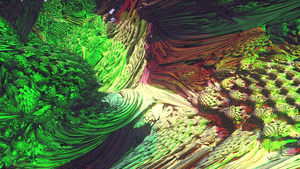Information
- Publication Type: Bachelor Thesis
- Workgroup(s)/Project(s):
- Date: 2010
- Date (Start): 15. September 2010
- Matrikelnummer: 0825045
- First Supervisor: Thomas Auzinger
- Keywords: fractal, CUDA
Abstract
A common problem when rendering fractals is, that the user has only limited abilities to choose a camera-position in real-time and therefore the workflow is not optimal. But not only the camera position In this paper the solution to this problem will be described by the example of the FraCuda application. It uses the CUDA-API to implement a Ray Caster for fractals, which includes Real-time Rendering techniques to improve the visual appearance of the resulting image. The application consists of a Real-time Rendering application for fractals and a program that generates high quality images with the same technique, which leads to an increased workflow when it comes to rendering hyper complex fractals.Additional Files and Images
Weblinks
No further information available.BibTeX
@bachelorsthesis{Roegner_RHF_2010,
title = "Rendering of Hypercomplex Fractals",
author = "Clemens R\"{o}gner",
year = "2010",
abstract = "A common problem when rendering fractals is, that the user
has only limited abilities to choose a camera-position in
real-time and therefore the workflow is not optimal. But not
only the camera position In this paper the solution to this
problem will be described by the example of the FraCuda
application. It uses the CUDA-API to implement a Ray Caster
for fractals, which includes Real-time Rendering techniques
to improve the visual appearance of the resulting image. The
application consists of a Real-time Rendering application
for fractals and a program that generates high quality
images with the same technique, which leads to an increased
workflow when it comes to rendering hyper complex fractals.",
address = "Favoritenstrasse 9-11/E193-02, A-1040 Vienna, Austria",
school = "Institute of Computer Graphics and Algorithms, Vienna
University of Technology ",
keywords = "fractal, CUDA",
URL = "https://www.cg.tuwien.ac.at/research/publications/2010/Roegner_RHF_2010/",
}

 thesis
thesis

